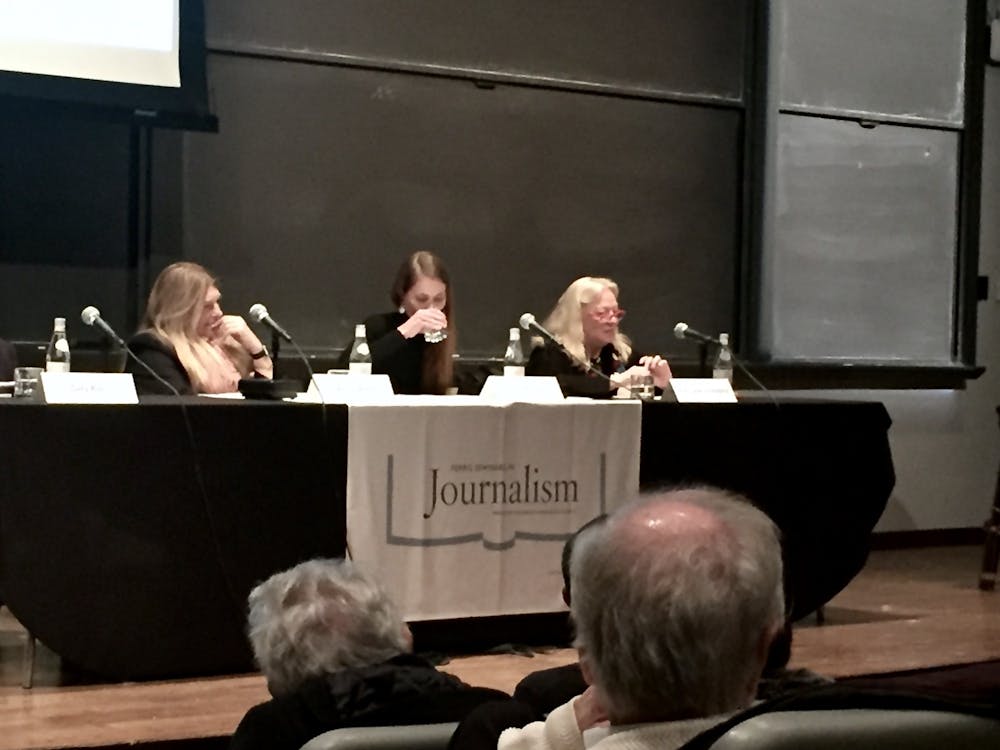On Thursday, March 5, a panel of University faculty members and New York Times journalists spoke on the increasing dangers reporters face around the world to a packed McCormick 101.
The panel included Kim Lane Scheppele, the Laurance S. Rockefeller Professor of Sociology and International Affairs; Suzy Hansen, a visiting Ferris Professor of Journalism in the Humanities Council; Carol Giacomo, a contributing writer at The New York Times Magazine, as well as a visiting Ferris Professor of Journalism and a member of The New York Times’s editorial board; and Gary Bass, professor of politics and international affairs.
Scheppele opened the conversation by discussing the recent proliferation of death threats toward journalists. In the United Kingdom, the number of annual recorded death threats against journalists has risen 14 times since 1980, Scheppele noted.
“The existence of death threats changes the way news organizations cover things,” said Scheppele, explaining that security concerns in foreign countries pressure many news bureaus into closing, meaning the reporters who stay are the ones most dedicated — “and frankly most opinionated.”
Repressive governments thus use death threats to “cull the field” of journalists and then paint the journalists who remain as the enemy, Scheppele added.
“Death threats also change the subject – they’re being reported on, as opposed to something else,” she continued, adding that death threats lead to self-censorship and eventually have the power to “change the people who are at the table.”
Hansen then discussed the decline of the free press in Turkey under President Recep Tayyip Erdoğan’s regime, citing her experience reporting and living in the country for over a decade. She recalled journalists in Istanbul placing cellphones in refrigerators before holding in-person conversations, as they knew their lines were tapped.
Many reporters have been imprisoned indefinitely, Hansen added.

“There was a cruel ritual where you’re let out of prison and then they just re-arrest you,” she said. “You can tweet about the economy at night, wake up, and be detained that morning.”
“Journalism in Turkey can now be equated with terror propaganda,” she said in reference to attacks made on the state-controlled media that proliferates Turkish airwaves.
Giacomo began her remarks by describing her first job in journalism, straight out of college.
“My biggest risk was having an irate reader shake a finger at me or yell at me over the banister at city hall,” she said, reflecting on her time at the Hartford Courant.

Even as she went on to report on the U.S. State Department and traveled to war zones — “I wasn’t a war correspondent” — she said she never felt that she was in danger.
“Until I was,” she said. “Our hotel was bombed … and [someone] was killed in the room directly above mine.”
The panelists’ largely concluded that though certain risks are inherent to journalists’ work, alarming developments have restricted the ways in which journalists can safely do their jobs.
“I wrote an editorial calling for the removal of the Pakistani chief of intelligence,” Giacomo said. “The next day, the ISI [Inter-Services Intelligence] held a conference just to denounce The New York Times. That certainly changed my behavior … I haven’t gone back [to Pakistan] since.”
Giacomo also spoke on journalists’ obligation to prove their own value to readers.
“There’s a great sense among Americans that a free press really isn’t that important,” she said. “There are people who think the president should be allowed to kill a story. There are people who think anonymous sources are paying newspapers to be anonymous.”
Those misconceptions, she believes, have arisen at least in part because of President Trump’s efforts to “denigrate and delegitimize” journalists.
“Trump is the first sitting president ever to file a defamation suit against a press organization,” Bass said.
Bass discussed how the public has become “numb” to the horror of the president labeling the media as the “enemy of the people.” The phrase, he noted, comes directly from the Stalinist Soviet Union, when putative “enemies” were condemned to the gulag system.
“Trump probably didn’t know that the first time he said it, but it’s been brought to his attention, and he just doubles down on it,” Bass continued.
He ended his portion of the panel with a call to action for the audience.
“Subscribe to The New York Times,” he urged. “If you already do, subscribe to the Washington Post. If you already do, find another newspaper and subscribe to that.”
The panel, titled “Perilous Reporting: The Growing Threat to Journalists in the Field,” was moderated by Eric Gregory, Professor of Religion and Chair of the University Council of the Humanities. The talk, which took place at 4:30 p.m. on Thursday, March 5, was co-hosted by the Woodrow Wilson School and the Program in Journalism.








